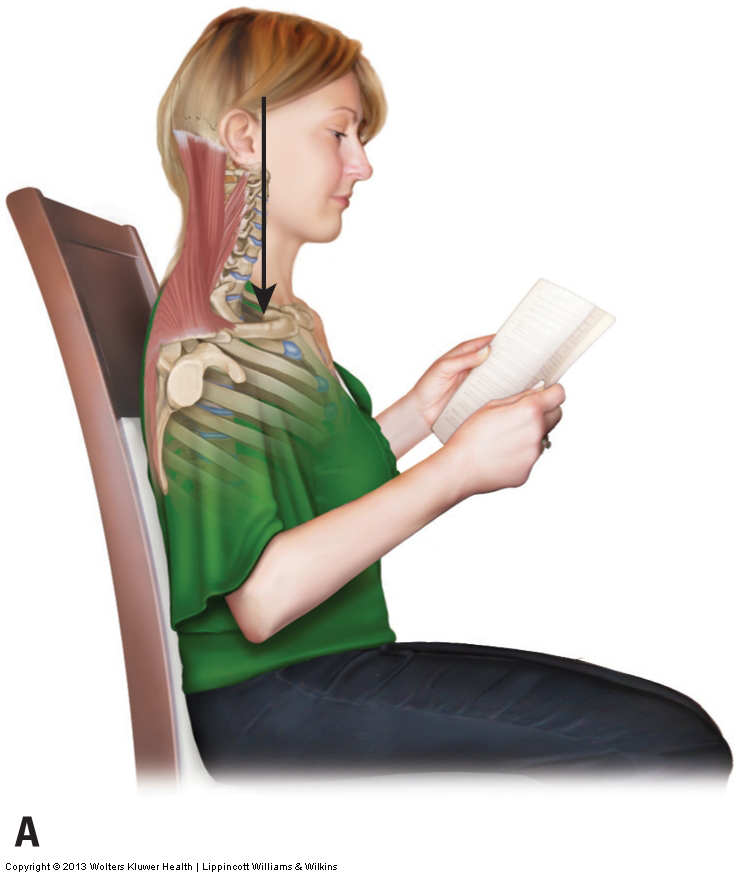Note: This is the second blog post article in a series of 14 articles on Assessment/Diagnosis of musculoskeletal conditions of the neck (cervical spine). See below for the other articles in this series.
Think of the health history as a conversation between the therapist/physician and the client/patient. The health history may begin by having the client complete a written questionnaire about the present condition as well as his or her past health history. The conversation continues with a verbal history in which the client answers additional questions regarding his or her health.
 The health history is usually done before the physical assessment exam because it helps reveal the problem regions that need to be assessed during the physical exam. If the history is thorough enough, the signs and symptoms discussed during the conversation will often indicate the client’s condition or conditions, allowing the examination to be more focused and efficient. Although there is no therapeutic rationale for asking the questions in a specific order, it may be helpful to the individual therapist to follow a consistent order when conducting a health history. Such consistency not only helps keep thoughts organized but also increases efficiency when returning later to review a client’s information.
The health history is usually done before the physical assessment exam because it helps reveal the problem regions that need to be assessed during the physical exam. If the history is thorough enough, the signs and symptoms discussed during the conversation will often indicate the client’s condition or conditions, allowing the examination to be more focused and efficient. Although there is no therapeutic rationale for asking the questions in a specific order, it may be helpful to the individual therapist to follow a consistent order when conducting a health history. Such consistency not only helps keep thoughts organized but also increases efficiency when returning later to review a client’s information.
However, it is also important to be flexible with questions. The client’s answer to one question will often determine the follow-up questions. Although it is impossible to state every question that should be asked during a health history, following are some of the key questions that should be asked:
Health History Questions:
- What are your height and weight?
- Are you right- or left-hand dominant?
- What is the problem area?
- When did symptoms first begin?
- What precipitated the problem? Was there a trauma or did it begin insidiously?
- Have you had this problem before?
- Have you had any other problems with your neck before?
- If there is pain, is the quality of the pain sharp or dull?
- Are there shooting pains or other referral of symptoms down into the upper extremities (arm, forearm, or hand)?
- Does this problem cause headaches?
- Are the symptoms (pain or other symptoms) related to the time of day? If so, is it worse first thing in the morning or at the end of the day?
- Are the symptoms related to certain postures or activities?
- Are there other precipitating factors that cause the symptoms?
- What increases the symptoms? What decreases the symptoms?
- Overall, since the problem began, is the severity getting better, worse, or staying the same?
- Have you had this condition treated yet? If so, by whom? What was their assessment/diagnosis? What was their treatment? What was your progress with this treatment? May I have written permission to contact the therapist/physician about your treatment?
- What do you think caused your condition?
In addition to questions that are specific to the client’s presenting complaint, it is also valuable to gather information about his or her general health:
- Do you have any other health conditions, musculoskeletal or otherwise?
- What is your history of broken bones/fractures, car accidents, and other physical traumas?
- Are you on any medications? Do you take them regularly, or are they only for a temporary condition?
- How much do you exercise?
- What postures (work and otherwise) do you assume most often?
- In what position(s) do you sleep?
- Do you smoke? Do you drink alcohol? If so, how much, and how often?
- What is your stress level?
- Is there a family history of musculoskeletal problems?
- Is there anything else that you would like to add that I have not asked about?

This blog post article is the second in a series of 14 blog post articles on Assessment/Diagnosis of musculoskeletal (neuro-myo-fascio-skeletal) conditions of the neck (cervical spine).
The articles in this series are:
- Introduction to Assessment/Diagnosis of the Neck
- Verbal and Written Health History
- Overview of Physical Examination Assessment
- Postural Assessment
- Neck General Orthopedic Assessment: Range of Motion and Manual Resistance Assessment
- Palpation Assessment
- Motion Palpation (Joint Play) Assessment
- Special Orthopedic Assessment Tests for the Neck – Space Occupying Conditions
- Special Orthopedic Assessment Tests – Space Occupying Conditions – Slump Test
- Orthopedic Assessment of Thoracic Outlet Syndrome – Adson’s, Eden’s, Wright’s
- Orthopedic Assessment of Thoracic Outlet Syndrome – Brachial Plexus Tension Test
- Special Orthopedic Assessment Tests – Vertebral Artery Competency Test
- Treatment Strategy and Treatment Techniques
- Assessment and Treatment of Specific Musculoskeletal Conditions


